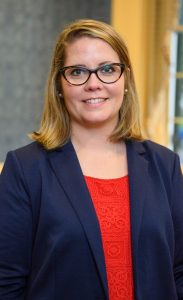OXFORD, Miss. – Anne M. Cafer has assumed duties as director of the University of Mississippi‘s Center for Population Studies, which works to educate, conduct research and engage in public outreach concerning population issues across the state.
Since July 1, the assistant professor of sociology has been overseeing outreach related to public data for the state of Mississippi, supervising the State Data Center housed on the Oxford campus and ensuring that the center is responsive to public needs related to data, while expanding its research portfolio on issues that matter most to Mississippians.
“I understand that this is an immensely important center for our state, particularly as new census data is released,” Cafer said. “I want to be conscientious on this front.”
Previously, Cafer was a principal investigator on several center-related grants – such as projects involving health, food security and community-based research – and has helped coordinate community activities in her role as coordinator for CPS’s Applied Policy and Community Research Laboratory. She also worked with staff to provide academic programming that married public data and community-based research.
“I’ve had excellent mentorship for this role,” she said. “The previous director and interim director have left the center in a really great position, giving me a great running start.”
Cafer is well-qualified to lead the center, said Jeffrey T. Jackson, chair and professor of sociology and anthropology.
“Dr. Cafer has established a remarkable track record of scholarly achievement and community engagement that makes her a perfect person to fill this important role,” Jackson said. “The center’s future is bright under her leadership and she has a clear vision for what it can achieve as it continues to grow and thrive.”
The new director has already set short- and long-term goals for herself and the center.
“Short-term, we want to work with existing center partners and potential partners to develop a community-centric research agenda,” she said. “This will help us be targeted in the types of grants and programming we pursue. Additionally, we’ll be working to make census data accessible and helping public entities navigate the new census data.
“Finally, we’ll be shifting our online interface to streamline the data request process for our State Data Center in the hopes that those requests are easier to make and information on how to get that information is easier to access.”
Cafer’s long-term goals include launching the center and its partners into the national scene.
“We’re at the cutting edge of integrating large public data and community-based research, two fairly disparate approaches to research,” Cafer said. “We’ll use that to help local policy makers as well as pull in the necessary resources to move the needle on those concerns identified in our early research agenda setting.
“While I anticipate this will include health, food systems and workforce development, it is likely to include a range of other areas.”
Cafer will continue to serve as co-director of the UM Community First Research Center for Wellbeing and Creative Achievement, or UM: CREW. The center serves as a resource for Mississippi communities – from counties and cities to groups of citizens – to create, access, analyze and apply knowledge and data to improve community well-being and local and regional decision-making.
Her work with UM CREW and CPS are highly complementary and will help her leverage research, outreach and programming to support Mississippi communities, she said.
Cafer grew up in rural, mostly agricultural Pike County, Missouri, where her working-class family and neighbors faced many of the challenges she studies, including food insecurity, poverty, limited access to health care and chronic underemployment. This sparked her interest in helping improve the lives of rural people.
“I want to understand how agricultural practices influence household nutrition in (small farms),” she said. “I also want to know how educational systems, food environment and health care systems contribute to population health, quality of life and residents’ sense of well-being in their community.”
Cafer earned undergraduate degrees in biology and sociology from Northwest Missouri State University, a master’s in anthropology from the University of Nebraska and a doctorate in rural sociology from the University of Missouri.
At UM, Cafer said she has honed her research skills in resilience with support – from technical to fiscal – from the university and her colleagues, including in the Department of Sociology and Anthropology, Center for Population Studies, McLean Institute for Public Service and Community Engagement and the College of Liberal Arts.
In 2019, she was awarded a prestigious Andrew Carnegie Fellowship, becoming the first Ole Miss faculty member – and the first faculty member from a Mississippi university – to receive the fellowship.
